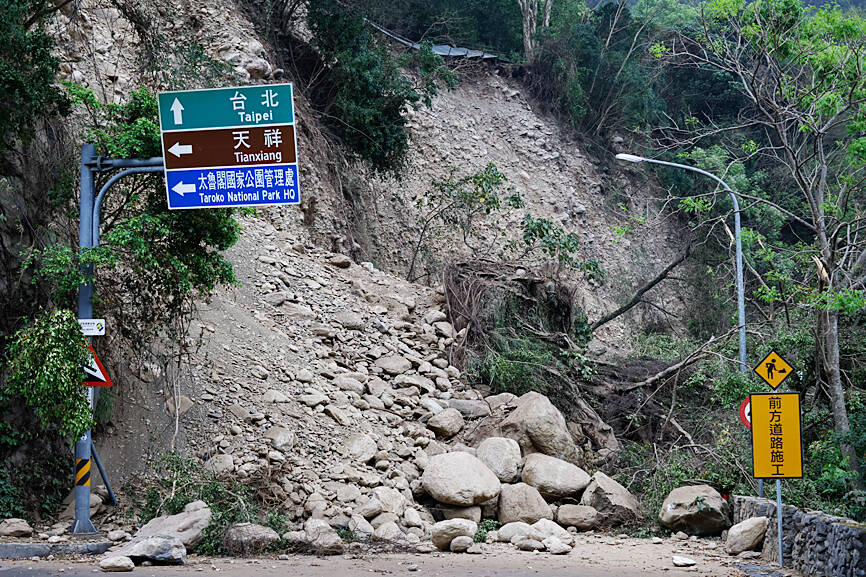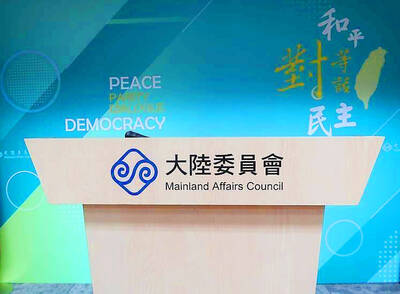About NT$3 billion (US$92.37 million) would be needed to revitalize tourism in Hualien County after it was devastated on April 3 by a quake measuring 7.2 on the Richter scale, Minister of Transportation and Communications Wang Kwo-tsai (王國材) said yesterday.
The quake, the largest to hit Taiwan in 25 years, caused severe damage to facilities and infrastructure in Hualien, including in Taroko National Park.
The Chateau de Chine in Hualien (花蓮翰品酒店) was forced to lay off 86 employees, as the hotel needs to be torn down and rebuilt due to damage.

Photo: Daniel Ceng, EPA-EFE
Many domestic travelers have canceled trips to the east coast due to aftershocks, which as of yesterday totaled 906.
The Ministry of the Interior on Monday said that the cost of rebuilding in Taroko National Park could reach NT$1 billion.
The Tourism Administration is planning three rounds of stimulus initiatives to reboot the tourism industry in the county, Wang told reporters before attending a Transportation Committee meeting at the legislature in Taipei.
The first round would consist mainly of disaster relief, while the second round would focus on funding for people whose homes were damaged or destroyed, he said.
The third round would be to subsidize individuals and group tours to Hualien after facilities are rebuilt, he said.
The initiatives have been estimated to exceed NT$3 billion, Wang said, adding that details would be finalized by the Executive Yuan and could be implemented next month.
The ministry is scouting for a potential corridor to build an extension of the Shuishalian Freeway — Freeway No. 6, which runs from Taichung’s Wufong District (霧峰) to Puli Township (埔里) in Nantou County and connects to Hualien County via provincial highways 14, 14A and 8 — to connect directly to Hualien, he said, adding that the study is to be completed by 2026.
The committee also reviewed a special bill proposed by Chinese Nationalist Party (KMT) Legislator Fu Kun-chi (傅?萁) that would mandate an extension of the freeway to Hualien.
“We began scouting for a potential route last year and a feasibility study will be conducted once one has been identified,” Wang said.
The Freeway Bureau said in a report that the extension would be 90km and have 18 tunnels, with the longest being 17.4km.
Experts believe the cost to build the extension would be high, as construction could take years due to the unpredictable geological conditions in the Central Mountain Range, the report said.
The road would also affect the environment, which could compromise road safety, it said.
Democratic Progressive Party legislators Lee Kun-tse (李昆澤) and Tsai Chi-chang (蔡其昌) said they oppose a mandate to build the extension.
“Geological surveys, feasibility studies, environment impact assessments and financial planning must be conducted for such a project,” Lee said. “The Suhua Highway Improvement Project has proven its value given how it came through during the earthquake, showing that safety and sustainability should be the top priority for such projects.”
“I understand every legislator’s need to seek funding from the central government for projects in their districts, but making construction a mandate contradicts the constitutional principle of separation of powers,” Tsai said. “If this precedent were set, it could potentially be followed by hundreds of mandates.”

A Chinese aircraft carrier group entered Japan’s economic waters over the weekend, before exiting to conduct drills involving fighter jets, the Japanese Ministry of Defense said yesterday. The Liaoning aircraft carrier, two missile destroyers and one fast combat supply ship sailed about 300km southwest of Japan’s easternmost island of Minamitori on Saturday, a ministry statement said. It was the first time a Chinese aircraft carrier had entered that part of Japan’s exclusive economic zone (EEZ), a ministry spokesman said. “We think the Chinese military is trying to improve its operational capability and ability to conduct operations in distant areas,” the spokesman said. China’s growing

BUILDUP: US General Dan Caine said Chinese military maneuvers are not routine exercises, but instead are ‘rehearsals for a forced unification’ with Taiwan China poses an increasingly aggressive threat to the US and deterring Beijing is the Pentagon’s top regional priority amid its rapid military buildup and invasion drills near Taiwan, US Secretary of Defense Pete Hegseth said on Tuesday. “Our pacing threat is communist China,” Hegseth told the US House of Representatives Appropriations Subcommittee on Defense during an oversight hearing with US General Dan Caine, chairman of the Joint Chiefs of Staff. “Beijing is preparing for war in the Indo-Pacific as part of its broader strategy to dominate that region and then the world,” Hegseth said, adding that if it succeeds, it could derail

COMPLIANCE: The SEF has helped more than 3,900 Chinese verify documents, indicating that most of those affected are willing to cooperate, the MAC said More than 3,100 spouses from China have submitted proof of renunciation of their Chinese household registration, the Mainland Affairs Council (MAC) said yesterday. The National Immigration Agency has since April issued notices to spouses to submit proof that they had renounced their Chinese household registration on or before June 30 or their Taiwanese household registration would be revoked. People having difficulties obtaining such a document can request an extension of the deadline or submit a written affidavit in lieu of it. The council said it would hold a briefing at 2:30pm on Friday at the immigration agency’s Taichung office in cooperation with the

CHIP WAR: The new restrictions are expected to cut off China’s access to Taiwan’s technologies, materials and equipment essential to building AI semiconductors Taiwan has blacklisted Huawei Technologies Co (華為) and Semiconductor Manufacturing International Corp (SMIC, 中芯), dealing another major blow to the two companies spearheading China’s efforts to develop cutting-edge artificial intelligence (AI) chip technologies. The Ministry of Economic Affairs’ International Trade Administration has included Huawei, SMIC and several of their subsidiaries in an update of its so-called strategic high-tech commodities entity list, the latest version on its Web site showed on Saturday. It did not publicly announce the change. Other entities on the list include organizations such as the Taliban and al-Qaeda, as well as companies in China, Iran and elsewhere. Local companies need